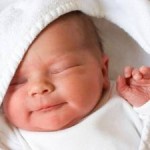What causes seizures in babies?
January 24, 2013 by admin
Filed under Baby Problems
 Seizures occur when the nerve cells in the brain fire abnormally as a result of nerve damage, problems with the brain’s chemistry, or a high fever. Both nerve damage and brain chemistry irregularities can be caused by a birth defect or by an injury to the brain or nervous system, such as a blow to the head.
Seizures occur when the nerve cells in the brain fire abnormally as a result of nerve damage, problems with the brain’s chemistry, or a high fever. Both nerve damage and brain chemistry irregularities can be caused by a birth defect or by an injury to the brain or nervous system, such as a blow to the head.
Febrile seizures are caused by high fever, they are harmless and common in children between 6 months and 5 years old. You need to ensure the baby has no health problems leading to an infection. Prevent baby from having fever as re- occurrence of a seizure or fits is high when body temperature crosses 101dec C. Constantly monitor baby’s temperature. If you make the baby sleep under a fan you cannot assess the temperature. Externally baby will look OK , but when you keep thermometer under the arm pit you will realize the difference.
Febrile seizures can also occur due to dehydration. Dehydration is a direct result of a previous illness that included sweating and fever. Malnutrition or a body weakened by disease or illness makes small children more susceptible to seizures.
Family history can play a role in toddlers or infants having seizures. If a family member was prone to or had seizures, especially febrile seizures, as a child this trait may be inherited.
What is epilepsy? Is seizure and epilepsy the same health issue?
Epilepsy is a condition that makes people more susceptible to having seizures. A child may have epilepsy if he has had two or more unprovoked seizures. There are many possible causes, such as head injuries, brain development disorders, infections or heredity. Usually, however, there is no detectable cause for a child’s epilepsy.
No , seizure and epilepsy are not the same. Seizure is a result of high fever and epilepsy is an unprovoked seizure.
Some people also refer this condition as convulsion or “fit”. The brain is an amazing, yet delicate structure that is able to send and receive millions of electrical messages within milliseconds. If there is an interruption in this constant flow of messages, the signals become jumbled and confused. These scrambled electrical impulses can quickly spread throughout the brain, causing a seizure. Fortunately, in seizure and convulsion, the brain eventually relaxes back into its usual pattern and the convulsions stop. Apart from some confusion, the person generally returns to normal.
What are the symptoms of a seizure?
The symptoms and degree of seizure varies from baby to baby. It depends on the baby’s physical condition . Listed below are the general symptoms observed for babies during a seizure.
- jerking movements of the arms and legs
- stiffening of the body
- wide open eyes staring at one particular point.
- White foamy saliva coming from the mouth.
- loss of consciousness
- breathing problems or breathing stops
- loss of bowel or bladder control
- falling suddenly for no apparent reason
- not responding to noise or words for brief periods
- appearing confused or in a haze
- nodding the head
- periods of rapid eye blinking and staring
- sleepiness and irritable upon waking in the morning
During the seizure, the child’s lips may become bluish and breathing may not be normal. The movements are often followed by a period of sleep or confusion.
You need to carefully observe your baby’s behavior and inform the pediatrician. This will enable the doctor to assess the situation and diagnose accordingly.
Do seizures cause brain damage?
Minor seizures or Febrile seizures are considered harmless if it lasts for less than 5 minutes. But seizures longer than that need medical intervention as they can damage the brain. Children having repeated seizures with high fever are affected in the long run . They will not be at par with all kids at school. Do not pressurize him to study. The baby’s mental growth will be retarded, the memory of the baby is also affected. Take extra care and do your best to ensure baby does not get high fever.
What should I do if I think my child has had a seizure?
Consult the doctor and check if the baby has to be brought to the hospital right away. Usually doctors refer for an ElectroEncephaloGraph (EEG) to record his brain’s electrical activity. I had a tough time to watch my baby when the technician was attaching electrodes to my baby’s head, but the procedure is painless. From the results, your doctor will be able to tell whether your child has had a seizure, whether he’s likely to have one again, and whether he needs further tests, such as an MRI or CT scan, or a consultation with a neurologist. There will be crests and troughs on the graph. The technician notes down all baby’s activities in that duration for example: if the baby coughs , sneezes and moves body to eliminate wrong interpretation.
There is nothing you can do at that time. Stay with your child until the seizure stops. Baby will go in for a long sleep as he is exhausted. Follow medical advise and medications religiously.
These are situations in a parent’s life when you need to gear up and stand by each other. Both the parents need moral support. This article is written to prepare you in case a situation develops. Your baby’s going to be fine.
No related posts.









